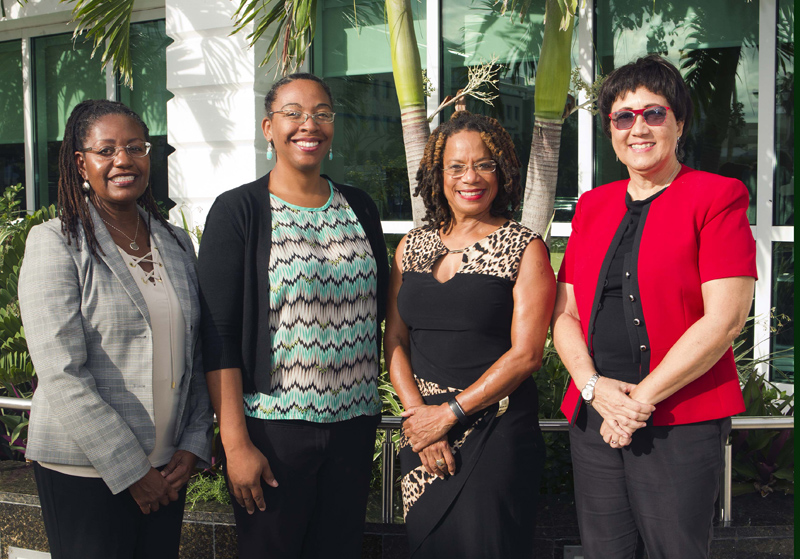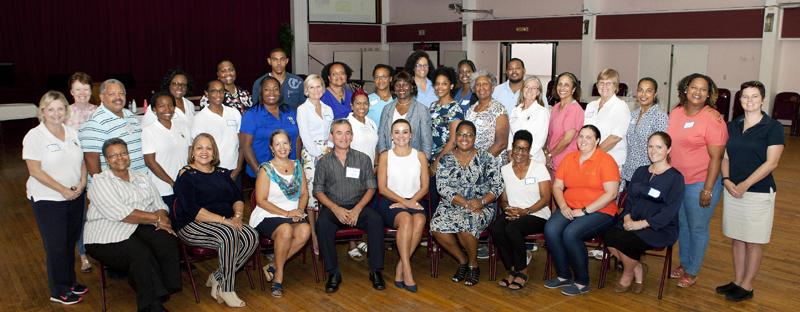Minister Wilson On Health Workforce Planning
In the House of Assembly today [Oct 6], Minister of Health Kim Wilson highlighted “what the Ministry of Health does to safeguard Bermuda’s health, and how we are supported by international bodies, like the Pan American Health Organization [PAHO].”
Minister Wilson said, “Health Workforce Planning is an extremely important endeavour. Bermuda needs to predict and plan for our health workforce needs, especially as we compete for health professionals due to a global shortage. The efforts of the Ministry of Health have been supported during the past two years by advisors from PAHO.”
Chief Medical Officer Dr. Cheryl Peek-Ball, Ms Nasolo Thompson of PAHO, Minister Wilson, Dr. Goede Hedwig of PAHO at the Health Workforce Planning session
“In the Bermuda Health Strategy, which is in fact Bermuda’s National Health Plan, action items included medical workforce planning. My Ministry’s work to improve the country’s health workforce is part of our broader strategic direction.
“This action is focused on health workforce planning in line with PAHO recommendations based on international best-practice. This means that it’s not just about doctors and nurses, but about all professions which complement and support healthcare, such as physiotherapy, psychology, dentistry, occupational therapy and many, many more.
“The Ministry of Health is committed to progressing toward the goal of universal healthcare, where every person has access to the basic health services they need without suffering financial hardship.”
PAHO Cold Chain Conference attendees including PAHO international immunization system experts Victor Gomez, Nora Rodrigues, and Dr Karen Lewis–Bell, all seated centre front. Mojtaba Haghgou [not pictured] also attended from PAHO
The Minister’s full statement follows below:
Mr Speaker and Honourable Members,
I stand before this Honourable House today to highlight two initiatives by my Ministry that few may be aware of, and I feel it is important that my Honourable colleagues and the public know what the Ministry of Health does to safeguard Bermuda’s health, and how we are supported by international bodies, like the Pan American Health Organization [or PAHO].
Mr Speaker, Health Workforce Planning is an extremely important endeavour. Bermuda needs to predict and plan for our health workforce needs, especially as we compete for health professionals due to a global shortage. The efforts of the Ministry of Health have been supported during the past two years by advisors from PAHO.
In the Bermuda Health Strategy, which is in fact Bermuda’s National Health Plan, action items included medical workforce planning. My Ministry’s work to improve the country’s health workforce is part of our broader strategic direction.
Mr Speaker, This action is focused on health workforce planning in line with PAHO recommendations based on international best-practice. This means that it’s not just about doctors and nurses, but about all professions which complement and support healthcare, such as physiotherapy, psychology, dentistry, occupational therapy and many, many more.
In our 21st century Bermuda, the healthcare needs of our community are being determined by the trends we observe in disease patterns and the well-documented demographic shift to an older population. The early onset of chronic preventable diseases—such as diabetes, kidney disease and heart disease—have an impact on our health workforce.
By 2030, it is projected that people over the age of 65 will increase from 11% to 22% of the population, while chronic non-communicable diseases are striking our people earlier in their lifespans. In addition to our concerted efforts to improve health promotion and prevention, Bermuda will need competent professionals in a variety of areas in health to tackle our new reality.
Mr Speaker, If these trends continue as they are projected, we will have more people to care for and each of those persons will need care for a longer period of time. Bermuda’s health system must prepare to support the long term care needs of the community, while at the same time trying to prevent and control these chronic diseases.
In short, there will be a demand for a health workforce with two unique skill sets: first, to encourage and support the lifestyle changes required to prevent chronic disease and second, the long-term management of those with chronic conditions.
It is clear we will need a variety of healthcare professionals, not simply traditional professions such as medicine, nursing and allied health. The future will see an expanded role for social workers, mental health professionals, pharmacists, health educators, addiction specialists, health information specialists and many other professions.
Mr Speaker, Bermuda’s education system, its immigration policies, economic conditions and employment circumstances will need to align to secure the necessary human resources to serve our population’s health needs.
Significantly, Mr Speaker, this health workforce planning project is showing clearly that Bermuda’s healthcare needs cannot be met solely by Bermudians. We will need to attract additional qualified health professionals when we cannot fulfil the demand from our own workforce.
And when it comes to the recruitment and retention of human resources for healthcare, Bermuda will be affected by the world-wide shortage of health professionals, the impact of globalization and the world’s economic climate. We will be competing globally for the same human resources.
Mr Speaker, Dr Hedwig Goede, PAHO Health System Services advisor, has come to Bermuda on four occasions in the past two years to assist us in the development of this plan. The process of health workforce planning enlisted input from a broad array of healthcare professionals and work environments, private and public.
Several consultative meetings and workshops have included the registered professions [nursing, medicine, pharmacy, allied health, clinical psychology and dentistry] as well as related professionals in social work, Workforce Development, Immigration, health administration, health economics, and insurance.
The most recent meeting on September 27th represented the conclusion of stakeholder consultation. Two advisors from PAHO attended to support the tasks required, Dr Goede and Ms Nasolo Thompson, PAHO consultant. Significantly, this technical support comes at no cost to the Government.
Mr Speaker, The aim of this health workforce plan is to be ready for the strains placed on Bermuda’s health system by the ageing of our population and an increase in chronic preventable diseases striking people at a younger age. This requires healthcare staff to educate people and also provide long-term care and management, and it is vitally important that we plan now in order to meet this increasing demand.
What I’d like to stress here, Mr Speaker, is that that there are a lot jobs in the health workforce and Bermudians should consider this highly-rewarding career path. We have information available on our websites on the health professional boards and associations, so students can contact them directly for guidance on suitable career paths, areas where we have great need for qualified, licenced professionals, and areas that may already be saturated.
For example, we have many paediatricians and obstetricians but declining birth rates; yet we have no Bermudian gerontologists and our population is ageing. There are many such examples, and persons interested in health careers should speak to the relevant professional associations.
The second initiative to highlight, Mr Speaker, is the handling of vaccines. Vaccines have been one of the most effective public health interventions, second to potable water. Vaccines prevent certain diseases and save lives, in infants, children and adults. There are important steps involved from manufacturing to the point of vaccination.
For this reason four PAHO Technical Experts visited Bermuda during the first two weeks of September 2017 to review the island’s system for receiving, storing and distributing vaccines, and to make specific recommendations for improvements.
Mr Speaker, Dr Karen Lewis Bell, Nora Rodrigues, Victor Gomez and Mojtaba Haghgou, international immunization system experts, assessed each step involved with the receiving, transporting, storing and distribution of vaccines within Bermuda’s healthcare system. Two capacity building workshops were held for healthcare providers involved with administering vaccines, including the Department of Health as well as primary care physicians’ offices, paediatricians and residential are homes.
The Department of Health procures most vaccines through PAHO which upholds the principles of quality and access to vaccinations for the benefit of all, in Bermuda and the Region. The areas for improvement, identified by the experts, will enable the inclusion of new vaccines to the Bermuda Child and Adult Immunization Schedules.
The community serves to benefit from the additional vaccines as these are recommended by the Bermuda Advisory Committee on Immunization Practices. Implementation of systems for monitoring and control assure Bermuda meets the standards set by PAHO to maintain vaccines for the country.
Mr Speaker, The Ministry of Health is committed to progressing toward the goal of universal healthcare, where every person has access to the basic health services they need without suffering financial hardship. I am personally deeply committed to this goal.
The departments and programs within the Ministry are working on many strategic initiatives to achieve this goal, and these examples of health workforce planning and immunization are only two such examples.
Mr Speaker, before taking my seat, I must also offer sincere thanks on behalf of the Ministry of Health and the people of Bermuda to the Pan American Health Organization [PAHO] advisors who have guided and supported us in these and many other initiatives.
Their experience and expertise is a constant reminder that Bermuda is not alone in facing many of these challenges, and that countries in the region and internationally are grappling with many of the same issues. By sharing their knowledge, they enable Bermuda to keep up with international best practice, without reinventing the wheel.
Thank you Mr Speaker.
Read More About
Category: All





Wow! That’s what I am talkin’ about.